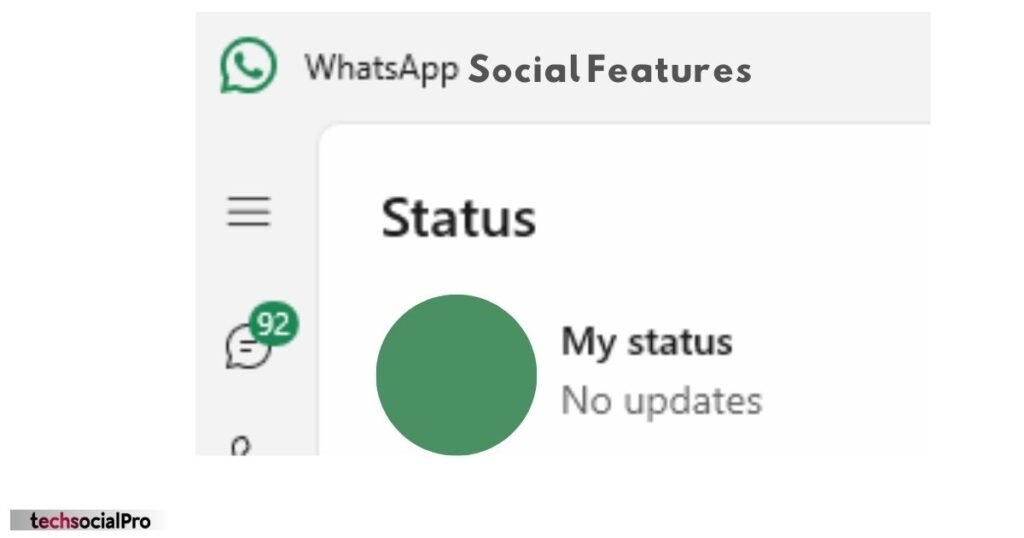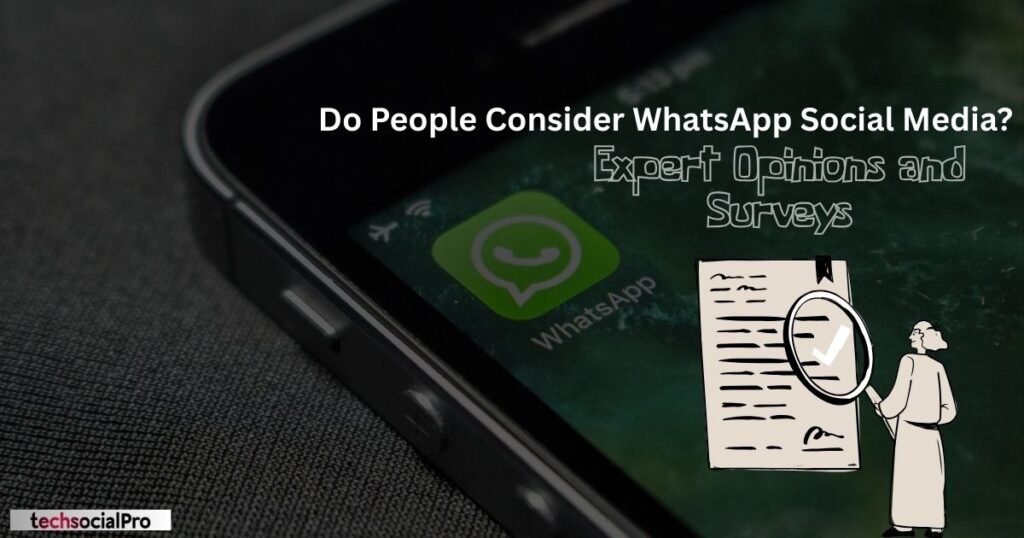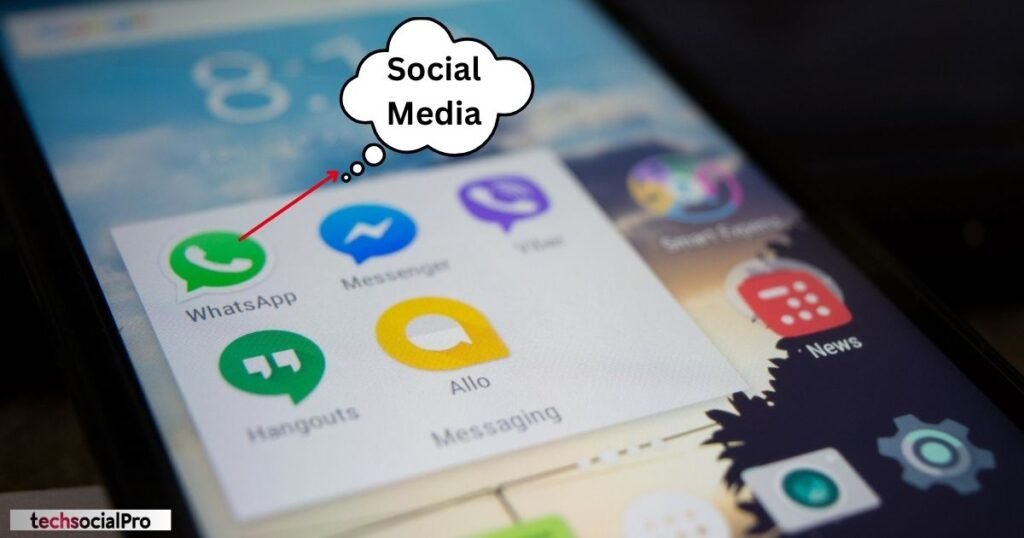With over 2 billion users, WhatsApp is among the most widely used messaging programs worldwide. People use it daily to share images and videos, send messages, make voice and video chats, and even change their status. WhatsApp has become a vital component of daily life, whether for work or personal talks.
Here’s a curious argument: Does WhatsApp function as a messaging app or a social media platform? Some individuals think email or SMS are merely private communication mediums. Others contend that WhatsApp is comparable to social networking sites like Facebook and Instagram because of features like group chats, WhatsApp Status, and the new Channels and Communities.
This question is crucial due to social media’s huge impact on online engagement, digital communication, and marketing. WhatsApp may be used differently by marketers and businesses, and if it is deemed social media, it might be subject to the same regulations as Facebook and Twitter. Nowadays, it is easier to grasp how individuals communicate and share information when we comprehend WhatsApp’s function in the digital world.
So, is WhatsApp truly social media, or is it something else? Let’s explore this topic further to find out!
WhatsApp’s Features: Does It Fit the Social Media Criteria?
To decide whether WhatsApp is a social media platform, we need to examine its features and compare them with traditional platforms like Facebook, Instagram, and Twitter.
1. Messaging vs. Social Media
As a private messaging app, WhatsApp lets users send voice notes, text messages, photos, and videos. In contrast to conventional social media sites that emphasize public conversations, WhatsApp was created with direct and intimate communication in mind.
WhatsApp’s primary characteristic is its end-to-end encryption, which restricts message reading to the sender and recipient. This differs from social media sites like Facebook, where posts and comments are open to the public, in that WhatsApp places a high priority on privacy and security.
Despite its current features that facilitate wider collaboration, WhatsApp’s primary function is still private messaging, which differs from most social media networks.
2. Social Features in WhatsApp

Over time, WhatsApp has introduced several features that resemble social media functions:
- Status Updates—WhatsApp Status enables users to upload text updates, images, and videos that vanish after 24 hours, much like Instagram and Facebook Stories. With this tool, users can share memories with their connections, much like they would on social networking.
- Group Chats—Individuals can form groups and converse simultaneously with several people. Nevertheless, WhatsApp groups are private, so only those who have been invited can access them. On the other hand, Reddit communities and Facebook groups permit open dialogue.
- WhatsApp Channels—With WhatsApp Channels, administrators can broadcast in both directions and notify users of updates. Like Telegram Channels, they do not allow interaction, such as liking or commenting on postings.
- WhatsApp Communities—This feature simplifies monitoring conversations about various subjects by combining several groups under one roof. However, unlike Facebook Groups, Communities do not facilitate widespread involvement or the discovery of public material.
These features give WhatsApp some social media-like elements. However, they are still focused on private communication rather than public interaction.
3. Lack of Traditional Social Media Features
Despite having some social functions, WhatsApp does not fully match the definition of social media because it lacks key elements found on platforms like Facebook, Instagram, and Twitter:
- No Public Profiles – On social media platforms, users have profiles that others can visit, follow, or interact with. WhatsApp does not have this—each account is private and only visible to contacts.
- No Algorithm-Driven Content Discovery – Platforms like Instagram and Twitter use algorithms to show trending content or suggest posts from people you don’t follow. WhatsApp does not have this feature; users only see updates from their saved contacts or subscribed channels.
- No Likes, Shares, or Public Comments – Social media thrives on engagement through likes, shares, and comments. In WhatsApp, interactions happen only within private chats or groups, with no option to like or share someone’s status with a broader audience.
Expert Opinions and Surveys: Do People Consider WhatsApp Social Media?

Let’s look at some survey results and expert opinions to understand how people see WhatsApp.
1. What Do Surveys Say?
Several surveys have been conducted to determine whether people consider WhatsApp a social media platform.
📊 YouGov Survey in the UK
A survey by YouGov in the UK asked people whether they think WhatsApp is a social media platform. The results were:
- 42% of Britons said YES – They believe WhatsApp is social media.
- 53% of Britons said NO – They do not consider WhatsApp social media.
- 5% were unsure.
These results show that opinions are divided, but a small majority see WhatsApp as just a messaging app.
🌍 Global Perception: Younger Users See WhatsApp as Social Media
The way people view WhatsApp depends on their age and how they use it.
- Younger users (18-30 years old) are likelier to see WhatsApp as a social media platform. They use features like Status updates, group chats, and WhatsApp Channels to stay connected.
- Older users (40+ years old) often see WhatsApp as a simple messaging app rather than a full social platform.
In some countries, WhatsApp is the main form of online communication, so people naturally use it socially. For example, in India, Brazil, and Mexico, WhatsApp is widely used for business, group discussions, and community updates, making it feel more like social media.
Also Explore: Chatterbait Social Media: The Ultimate Guide 2025
2. What Do Tech Experts Say?
Technology experts and researchers also have different views on whether WhatsApp is a social media platform.
💡 WhatsApp is Not Social Media (Messaging Perspective)
Some tech analysts argue that WhatsApp does not fit the definition of social media because:
✔ It is designed for private, direct communication, not public sharing.
✔ It lacks a news feed, public profiles, and content discovery algorithms.
✔ Social media platforms like Facebook and Instagram allow public interactions, while WhatsApp is focused on private chats.
💡 WhatsApp is a “Private Social Media” (Hybrid Perspective)
According to several analysts, WhatsApp is a private version of social networking. They contend:
✔ WhatsApp Communities and Channels facilitate one-to-many communication, akin to platforms like Telegram and Twitter;
✔ Numerous companies and influencers use WhatsApp to interact with clients and followers, just like on conventional social media;
✔ Features like status updates and group chats enable social interaction, albeit in a more intimate setting.
Meta’s (Facebook’s) View on WhatsApp
WhatsApp is owned by Meta (formerly Facebook), which owns Facebook, Instagram, and Threads. While Meta promotes WhatsApp as a messaging app, it has been adding more social features, which suggests it might see it as a hybrid platform between messaging and social media.
Conclusion: Is WhatsApp a Social Media Platform?
The debate over whether WhatsApp is social media concerns how we define social platforms. It is more than just a messaging app; it also lacks key features that define traditional social networks.
- Hybrid Platform – WhatsApp combines messaging with social features like Status updates, Groups, and Channels, making it partly social but not fully.
- A Private Social Network – Unlike Facebook or Instagram, WhatsApp does not have public profiles, algorithm-driven content, or viral post sharing, making it a closed network rather than an open social platform.
While WhatsApp has some social media-like features, it does not fully qualify as a traditional social platform. It remains a private messaging app with limited public interaction, making it a hybrid rather than a full-fledged social network.
Reference: According to the YouGov Survey, 53% of Britons do not consider WhatsApp social media, proving that most users still see it as just a messaging app.
What do you think—Is WhatsApp a social media platform or a messaging tool? Let us know your thoughts!
FAQs: Is WhatsApp Social Media?
1. Is WhatsApp considered a social media platform?
While WhatsApp has some social media-like features, it does not fully qualify as a traditional social platform. It remains a private messaging app with limited public interaction, making it a hybrid rather than a full-fledged social network.
2. What makes an app a social media platform?
A platform is considered social media if it allows:
- Public user interaction (likes, shares, comments).
- Content sharing that reaches beyond private connections.
- Algorithm-driven content discovery to promote engagement.
Since WhatsApp focuses on private messaging, it doesn’t fully fit this definition.
3. How is WhatsApp different from Facebook and Instagram?
Facebook and Instagram are platforms built for public engagement. Users can share posts, follow influencers, and engage with a wide audience on these platforms. WhatsApp is more of a communication tool than a social media site because it is designed for private, end-to-end encrypted discussions.
4. Can WhatsApp be used for social media marketing?
Indeed! Organizations widely use WhatsApp for assistance, brand engagement, and consumer interaction. However, it is more of a direct communication tool than a promotional place because it lacks the ad-driven marketing capabilities on Facebook and Instagram.


